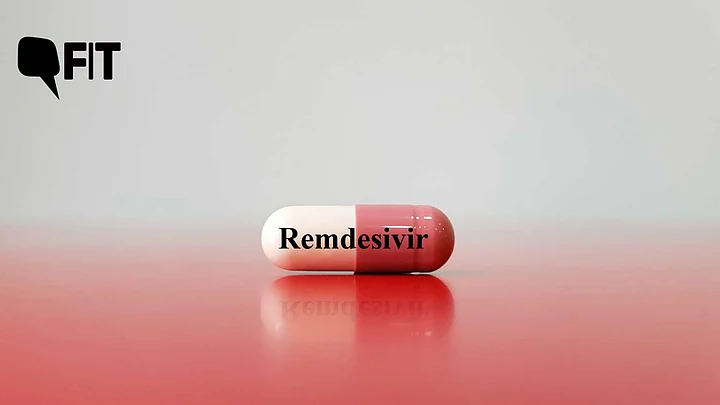The scientific community is united by a common goal today; to search for viable treatment options for COVID-19, the disease that has taken over 1,00,000 lives globally.
While trials and experiments are ongoing, a particular drug has occupied much of the world’s attention. Remdesivir, an experimental anti-viral drug that was developed by ‘Gilead Sciences’ to work against Ebola, has shown promise in fighting the novel coronavirus. In the press briefing by the health ministry on Monday, 13 April, Director-General of the Indian Council of Medical Research (ICMR) also said that the country is awaiting results from the World Health Organisation’s ‘solidarity’ trial to know the medicine’s efficacy and decide how to take this forward.
So what do we know about the drug so far and is it too soon to be optimistic? FIT explains.
The Evidence
In an early analysis conducted by researchers on 53 COVID-19 patients who needed respiratory support, it was found that a ‘compassionate’ use of remdesivir resulted in ‘clinical improvement’ in almost 68 percent of the cases.
For the study published in the New England Journal of Medicine, the hospitalised patients received up to a 10-day course of remdesivir, consisting of 200 mg administered intravenously on day 1, followed by 100 mg daily for the remaining 9 days of treatment from January 25 to March 7. Of the 53 patients included in this analysis, 40 (75%) received the full 10-day course of the drug, 10 (19%) received 5 to 9 days of treatment, and 3 (6%) fewer than 5 days of treatment.
Study lead author Jonathan Grein, director of hospital epidemiology at Cedars-Sinai Medical Center in Los Angeles was quoted in BloombergQuint as saying, “We cannot draw definitive conclusions from these data, but the observations from this group of hospitalised patients who received remdesivir are hopeful.”
Almost seven clinical trials are underway to better understand the extent to which the medicine can help. China has initiated two studies in early February for patients with moderate and severe symptoms of the disease. Two studies are being conducted by Gilead in areas with a high prevalence of COVID-19 in the United States, Asia and Europe. A randomised global trial, enrolling around 800 people, has also been initiated by the US National Institute of Allergy and Infectious Disease on February 21.
Another large scale global study that will be assessing remdevisir is the World Health Organisation’s ‘Solidarity’ trial, along with the Inserm DisCoVeRy trial that recently began in Europe.
Here is a summary of these trials and when the results are expected:
While the findings from larger experiments are awaited, what can we make out of our current knowledge of the drug? Experts from the field answer.
‘Promising on Paper, but Can’t Be Certain’
Dr Naga Suresh Veerapu, Assistant Professor, Dept of Life Sciences at Shiv Nadar University, told FIT that it is too early to call on the effectiveness of remdesivir against SARS-CoV-2 (the official name of the novel coronavirus).
The aforementioned study is funded by Gilead Sciences, the company that developed the investigational medicine and is supplying it for these trials. In an open letter dated 10 April, CEO Daniel O’Day wrote, “Remdesivir is an investigational treatment and has not been approved for use anywhere in the world. In the broader efforts to determine whether it is a safe and effective treatment, we have some way to go.”
FIT spoke to Dr Shahid Jameel, a well known Virologist & CEO of Wellcome Trust DBT India Alliance, who explained the way this compound seems to work on other RNA viruses. “It is a nucleotide analogue, which means that it can replace one of the alphabets in the growing RNA chain of the virus. When that happens, the chain terminates.”
“In the limited setting of this small trial, the drug did show positive results. We have to realise that in pandemic situations when people are dying, it may not always be possible to conduct the control trials. Who would we put in a control group? That’s an ethical dilemma. But larger trials should definitely be looked at. The drug may not be advisable for people who have mild disease and can be taken care of by supportive therapy. This will all have to be substantiated in bigger studies,” he adds.
FIT also spoke to Dr Om Shrivastav, Director, Infectious Diseases, Jaslok hospital and Research Centre, who said that even though it is a little premature to comment on it, the drug looks promising.
He points out, however, that a drug that works on people of one country may not necessarily work universally. “We should be hopeful. But there are other drugs that have worked well in some countries and not in India. It is a complex situation.”
He adds that other antivirals could also be tested against the disease as our understanding about it evolves. Antiretroviral drugs for HIV, for instance, have had one large trial which did not show any survival benefits. But the lopinavir/ritonavir combination that has been focused on in these studies, is not the newest among these drugs. Hydroxychloroquine (HCQ) may also be a viable option and could provide multiple benefits, but again, more concrete evidence is needed to be certain, he says.
While most results of the ongoing trials on remdesivir are expected by May, O’Day writes in the open letter that ‘the timelines are determined by epidemiology and the numerous challenges that come with studying a treatment for a newly emerged disease’.
“As with so much in this pandemic, this is unchartered territory for many of us involved in the process,” he says.
(At The Quint, we question everything. Play an active role in shaping our journalism by becoming a member today.)
